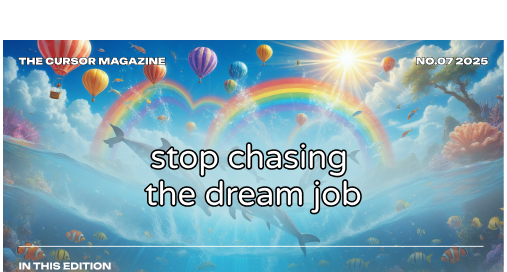How do you define a meaningful career? Is it about societal impact, personal growth, salary? Is your career just your job or is it something more?
Over the years I’ve spent a lot of time thinking about this. The more experience I gained, the more my job started to matter to me. It became a powerful source of purpose. Something I shaped my identity around and a vehicle to realize all my dreams and ambitions.
Unsurprisingly, that mindset wasn’t sustainable.
The Search for the Dream Job
When we talk about the Dream Job, we talk about a job that feels meaningful, aligns with our values, makes our resumes a little shinier and helps us grow. At the same time, it’s supposed to offer work-life balance, good pay and just the right amount of community. Enough to feel connected, but not so much that you start wondering if you’ve joined a cult.
Of course, in reality these “dream jobs” are hard to find. Some argue there is no such thing as a dream job.
That didn’t stop me from pursuing it anyway.
With that pursuit came a steady growing list of expectations on what my job should fulfill: salary, work-life balance, projects, a good connection with my colleagues, alignment with my personal values and above all doing something meaningful and have a positive impact on society.
Talking to design peers, I realized I wasn’t alone. Many of us feel pressure to land a job that checks every box. We tell ourselves we need to work at mission-driven companies, that our values must align, that we need higher pay, more equity, better titles. Doing meaningful work seems to be something designers are especially preoccupied with. We call ourselves advocates of the user. Our work shouldn’t just be usable. It should be useful, delightful, ethical, sustainable.
So I started asking: is the pursuit of the dream job actually sustainable or even reasonable? And where did this idea of the Dream Job come from?
I grew up in the 90's and early 2000s in a typical household with a working dad and a stay-at-home mom. I spent my afternoons surfing a web that felt exciting and optimistic. I listened to the cool stories my dad would tell about his business trips to this magical place called Sillicon Valley. He would bring home merch and souvenirs from obscure companies. Some names forgotten forever, some now being the tech monoliths we all know.
Having a job sounded exciting to 7-year-old me. You got to go on trips and work on a computer, what's not to like?
The careers our parents have or had are no longer realistic nor aspirational to us Millennials and Gen Z'ers. Being able to buy a home or start a family on just one income seems like something so unattainable that even trying feels foolish. There is no incentive anymore to spend decades at a company, slowly climbing the corporate ladder. And Silicon Valley? That place has lost it's magic on me a long time ago.
So the millennials and zoomers are left disillusioned. What we were promised and shown by our parents is a world that's gone. Now we have to carve out a new attitude and expectations around our career.
Burnout, Layoffs, and Quiet Quitting
Even when we find work that feels meaningful, it doesn’t mean we’re protected from burnout. In recent years, I’ve been surrounded by a shockingly high number of people who either went through burnout, are currently experiencing i or are teetering on the edge. They tend to have a few things in common. They care deeply about their work. They’re ambitious. They pour themselves into their jobs. With the waves of layoffs we’ve seen, it's only reasonable to question whether that kind of emotional investment is really worth it.
Just when many people faced gruel layoffs or where stuck home with a burn-out, a new term started making headlines: quiet quitting. As defined by Anthony C. Klotz and Mark C. Bolino in Harvard Business Review, quiet quitting is:
"...opting out of tasks beyond one’s assigned duties and/or becoming less psychologically invested in work."
It’s easy to see why employers aren’t thrilled about this mindset. But from an employee’s perspective it makes sense. In a time where company loyalty often goes unrewarded, setting firmer boundaries isn’t laziness. It’s self-preservation.
Some argue that ‘quiet quitting’ is just a negative label for something healthier: protecting your time, your energy, your wellbeing.
My Job Isn’t My Career
Not long ago, I was deeply unhappy at work even though I had a job that checked many of the requirements of a Dream Job. It paid well. It was at a respectable company. I felt truly connected to the product. But every day felt like I was wasting my time on busywork. There was no meaning, no measurable impact and no room for growth.
I started asking myself hard questions: Was I being ungrateful? Was I expecting too much? Did it even matter that the job felt pointless if it covered the bills?
Through that experience I came to understand how pursuing the idea of a Dream Job actually kept me from building a meaningful career. My job and my career are not the same thing. A job is your day-to-day. A career is the long arc. It spans years, roles, companies and growth. While I can accept that a job might sometimes just be a paycheck, I know that my career matters deeply to me.
After quitting that job, I took some time off and re-evaluated what I actually wanted. I have different priorities now than I did at the start of my career.
I’m more intentional with my career moves
It’s okay to have a job that doesn’t feel deeply meaningful, for a while. But it has to contribute to the bigger picture. If it doesn’t help me grow, it’s a dealbreaker. Even if it’s comfortable. Even if it pays well.
I’m focusing on my values and integrity
I used to believe that your worth as a designer was measured by external validation like landing a FAANG role. But those companies never appealed to me. That contradiction used to make me insecure. Now I trust my intuition and following what feels right has led me to work on products I genuinely believe in.
Letting go of the pressure to chase prestige has been one of the best decisions I’ve made. Titles and levels vary wildly between companies. Sometimes a role with a lower title comes with better pay, benefits, and alignment. So what's the value of a chasing jobtitles anyway?
I’m loyal to my career - not a company
What happens when people over-identify with their company? It becomes their entire identity. And when that connection is severed through layoffs, burnout or just disillusionment you lose your entire sense of worth.
While I do want to feel connected with the work I do and the place I work at, the current work climate has made me realise that you need to be loyal to your career because no one else will vouch for you. That means seeking growth outside of work, pursuing side projects, exploring new topics, building skills even if they’re not directly tied to my current role.
Above all, loyalty to my own career means remembering this: my job might change. But my career is mine to shape
I’d love to hear from you….
How do you define your career and your job? How has your relationship to both changed over the years?
In the next publication: Developing your taste
What does it mean to be original and how do you find your own taste in design?








I don’t know how you do it but you always write about the themes that are on my head recently 😂 Absolutely loved this piece on chasing the dream job - and how exhausting it is to constantly pursue checking off all the marks for it to ‘feel’ right. I’ve been re-reading ‘A job to love’ which touches on similar frustrations and the need of approaching this matter as a ‘good enough’ job, if you wanna check it out! → https://www.theschooloflife.com/shop/a-job-to-love/
Thanks for this piece! Read you soon, Maureen ✨